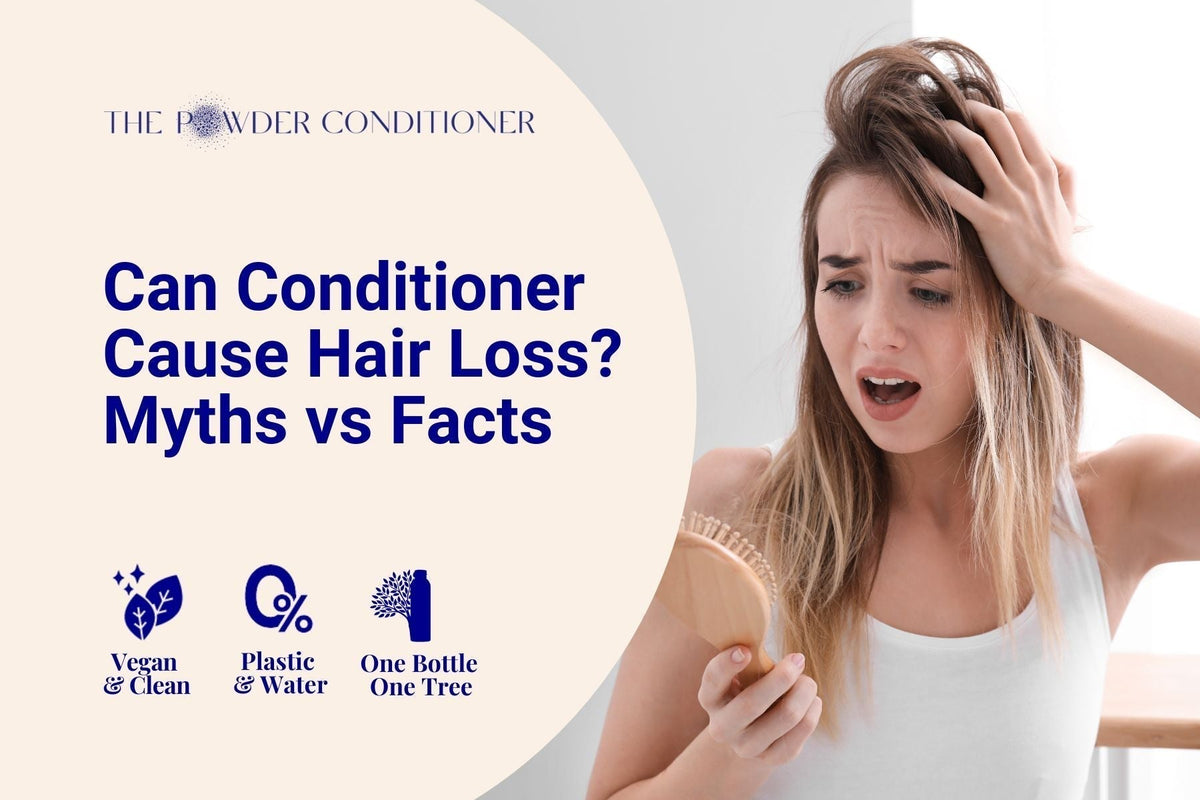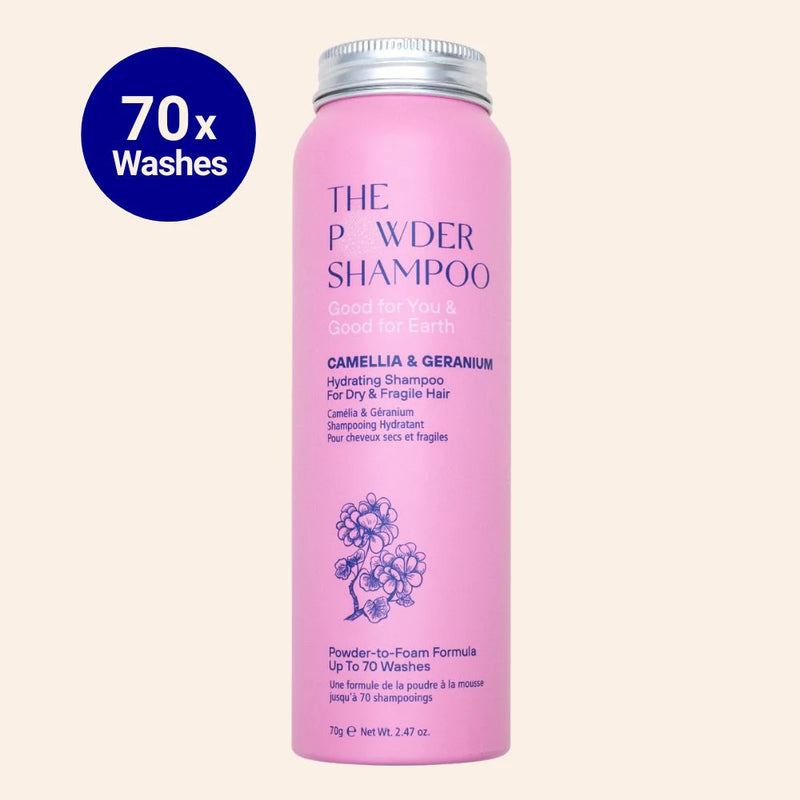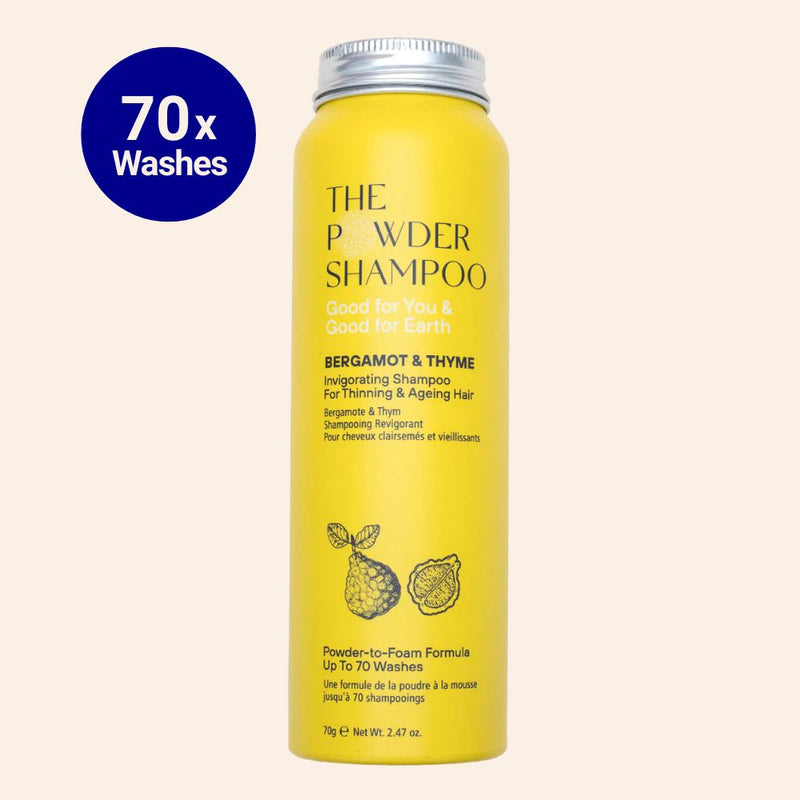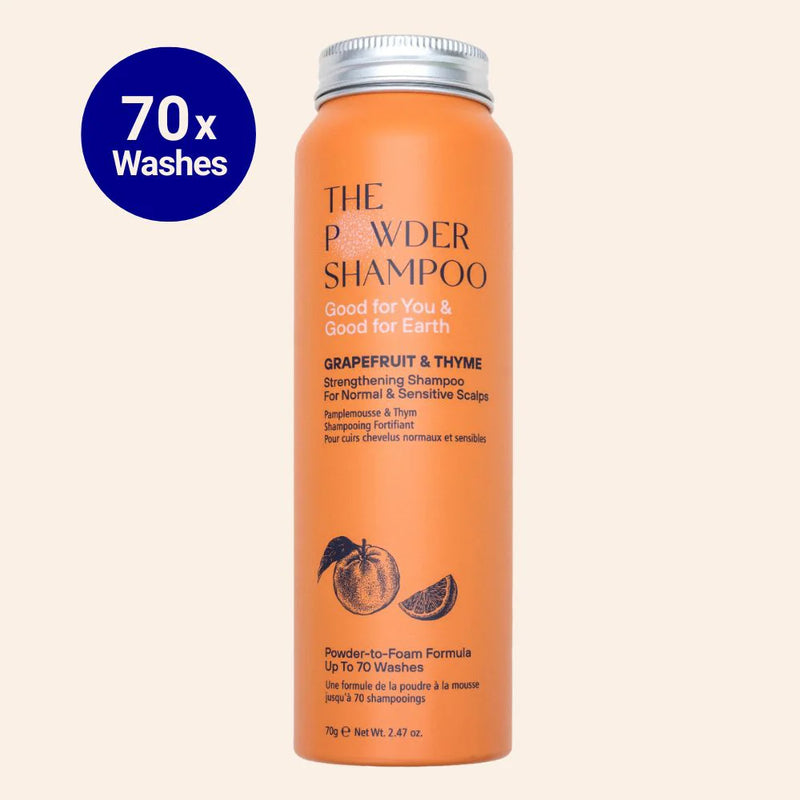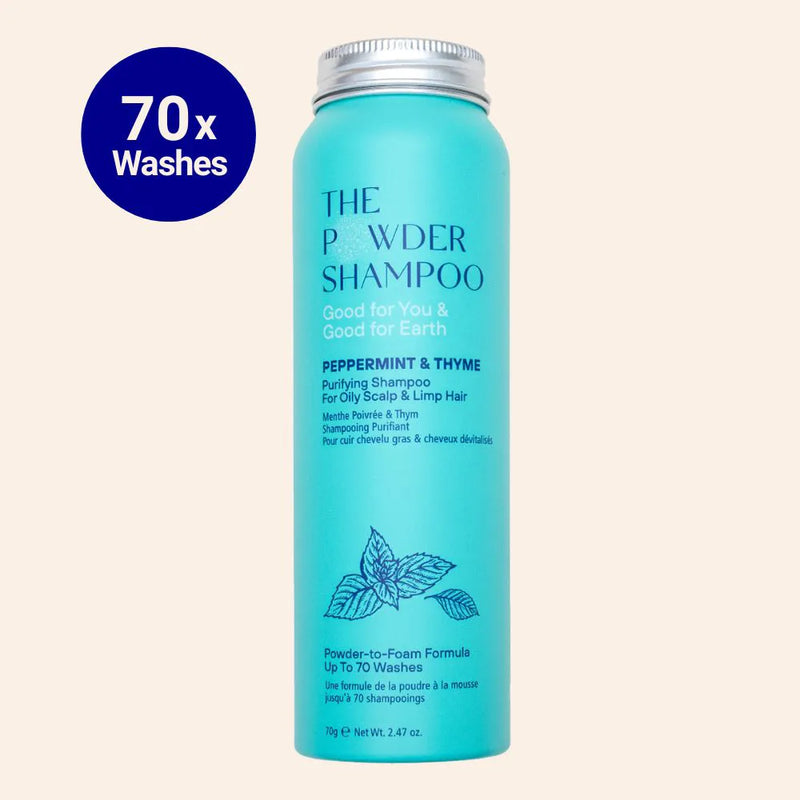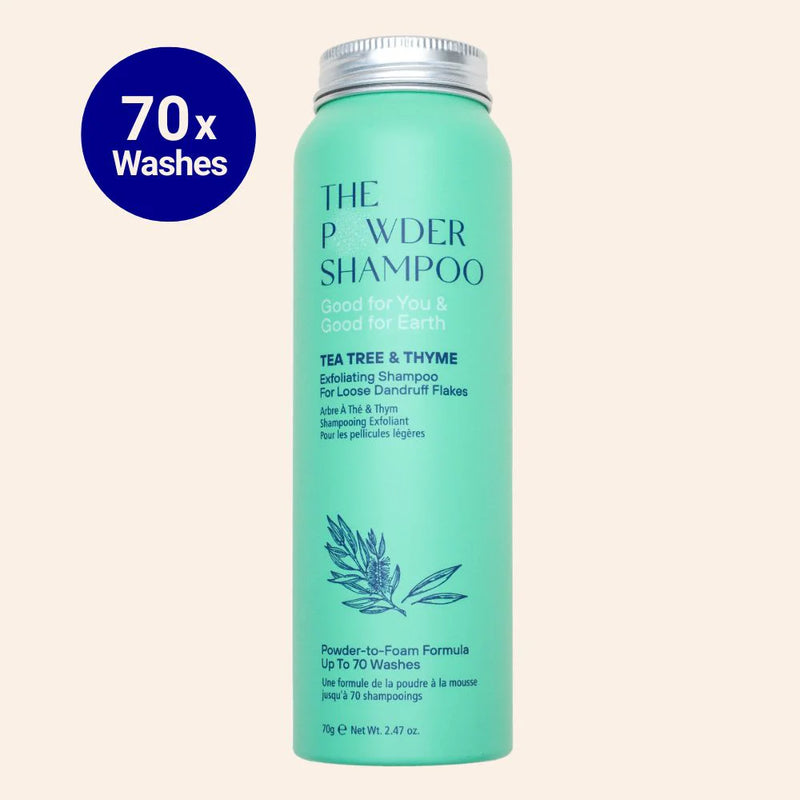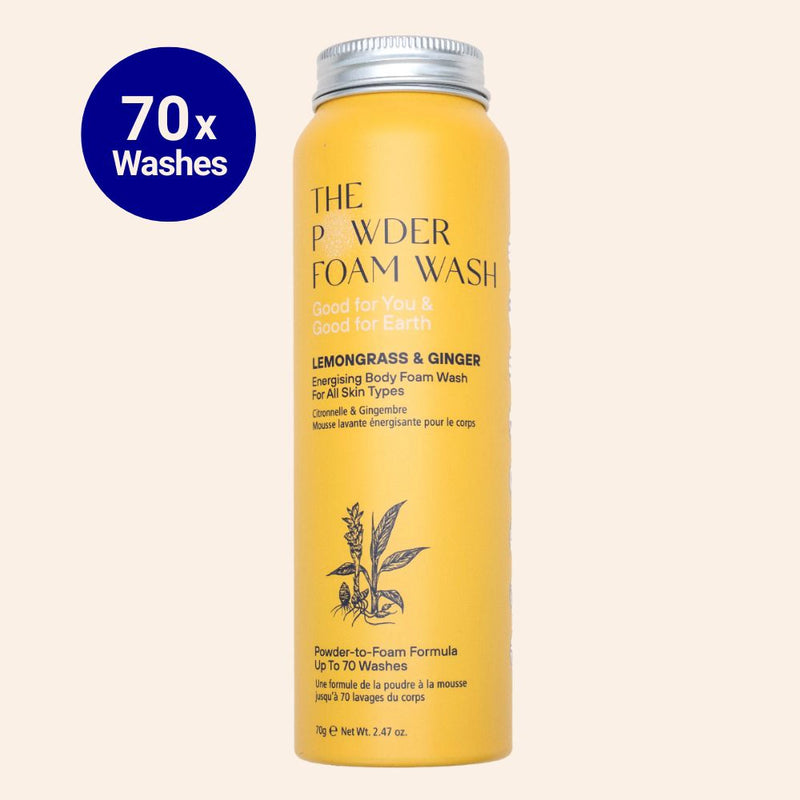How Does Powder Shampoo Work? Hair Care Routine Guide

Powder shampoo is a revolutionary hair care product that offers a unique and effective way to cleanse your hair. So, how does powder shampoo work? When mixed with water, the powder transforms into a rich lather that gently cleanses your hair and scalp. To use, sprinkle the powder into your hand, add a small amount of water to create a lather, and then massage it into your wet hair as you would with regular shampoo. Rinse thoroughly to reveal clean, fresh hair without using traditional liquid shampoo.
Interested in adding this type of shampoo to your hair care routine? Read on for a comprehensive guide, including step-by-step instructions and expert tips to ensure your hair stays healthy and beautiful!
What is Powder Shampoo and How Does It Work?

Powder shampoo works by concentrating the cleaning power and activating it when you need it. Here's the breakdown:
1. Ingredients
These shampoos skip the water that makes up a large portion (around 80%) of traditional liquid shampoos. Instead, they focus on the active ingredients for cleaning and hair care. This might include things like:
- Cleansing agents: Cleansing agents in powder shampoos, works by creating a lather to lift the dirt, oil, and impurities from your hair and scalp. The best example is Sodium Cocoyl Isethionate which is derived from coconut oil. This plant-based surfactant makes the cleaning benefit of every powder shampoo effective and powerful.
- Botanical powders: Ingredients like Papaya Enzyme, Rice Protein, Biotin and even Licorice Roots can provide gentle cleansing and additional hair benefits.
- Other hair care ingredients: Depending on the brand, you might find ingredients for specific hair needs, like nourishing oils or soothing chamomile.
2. Activation
When you're ready to use the shampoo, mix a small amount of the powder with water in your palm or directly on your palm / hair. This hydrates the formula and activates the cleansing agents.
3. Lathering and Cleansing
The mixture will typically lather up similarly to traditional shampoo. You then massage it into your scalp and hair to cleanse it just like you would with regular shampoo.
4. Rinse and Feel the Difference
Rinse the shampoo thoroughly from your hair, and feel how smooth and alive your hair is.
Now that you know how it works, it’s time to discover if powder shampoos are safe. Let’s find out which ingredients should be avoided to protect your hair from damage.
What Are the Ingredients that You Should Avoid When Buying Powder Shampoo?

Not all powder shampoos are built the same. There are products that offer too many promises but there are hidden red flags that can potentially damage your hair. These ingredients are Sulfates, Silicones, Parabens, Phthalates, and Synthetic Fragrances.
1. Sulfates
Sulfates, the cleansing agents in many shampoos, offer a squeaky-clean feeling, but their effectiveness can come at a price. Here's why you should avoid it:
- Disrupts Moisture Balance: Sulfates can be overly aggressive, stripping away natural oils essential for healthy hair and scalp. This dryness can lead to frizz, breakage, and even scalp irritation.
- Damages the Scalp: The harsh cleansing action of sulfates can disrupt the scalp's natural barrier, making it more vulnerable to irritation from other products and environmental factors. Therefore, if you experience scalp itchiness, redness, or dryness, sulfate-free shampoos can offer a gentler cleansing experience.
- Fades Colored Hair: Sulfates can quickly remove hair color molecules, leading to faster fading, especially for those with vibrant or frequently dyed hair. Sulfate-free options can help extend the life of your color treatment.
- Makes the Hair Thin and Brittle: Some studies suggest that long-term use of sulfates may potentially damage hair follicles, contributing to hair thinning or loss. While the evidence is evolving, opting for a sulfate-free shampoo might be a proactive approach for those concerned about hair health.
If you're experiencing dryness, color fading, scalp irritation, or hair concerns, then exploring sulfate-free alternatives might be beneficial, like The Powder Shampoo.
2. Silicones
Silicones are known to give magic to hair products. But what you see might not be the whole story. Let's talk about why silicones should be avoided.
- Gunky Buildup: This buildup makes your hair feel heavy and dull, kind of like wearing a dirty hair tie all day.
- Moisture Blocker: Silicones can block the good stuff (vitamins) from getting in. As a result, it disrupts the moisture balance of your scalp and hair.
- Not for Thin Hair: Silicones can weigh down thin hair, making it look flat and lifeless.
Remember, while silicones offer a quick fix for shine and manageability, the long-term drawbacks like buildup and moisture blockage can be detrimental to your hair's health.
3. Parabens
Parabens have been a mainstay in cosmetics for decades, acting as preservatives to keep products fresh and shelf-stable. But recently, these handy little ingredients have come under scrutiny for their potential downsides. Let's delve into why parabens might not be the best fit for everyone's hair care routine.
- Possible Hormone Disruption: Some studies suggest parabens might mimic estrogen in the body, raising concerns about potential hormonal imbalances. While research is ongoing, it's a cause for some to avoid them altogether.
- Scalp Irritation: Parabens can irritate the scalp, especially for those with sensitive skin. Itching, redness, and discomfort are no fun, and parabens could be the culprit.
- Lack of Long-Term Safety Data: While generally considered safe by regulatory bodies, some question the long-term effects of continual paraben exposure, particularly on hair and scalp health.
By understanding these concerns and paying attention to your scalp's reaction, you can make an informed choice about whether parabens are right for your hair care routine.
4. Phthalates
Phthalates are a group of chemicals commonly found in a wide range of consumer products, including hair care. They're often hidden behind terms like "fragrance" or "parfum" on ingredient lists, making it tricky to know if your favorite shampoo or conditioner contains them. But why might you want to avoid phthalates in your hair care routine? Let's explore the potential downsides:
- Hormonal Disruption: Similar to parabens, some studies suggest phthalates might mimic hormones in the body, potentially leading to hormonal imbalances. While research is ongoing, it's a concern for some.
- Scalp Irritation: Phthalates can irritate the scalp, especially for those with sensitive skin. Itching, redness, and discomfort are no fun, and phthalates could be the culprit.
- Hair Loss: Some studies suggest a possible link between long-term phthalate exposure and hair loss. While the evidence isn't definitive, it's worth considering if you're concerned about hair health.
By being aware of these concerns and opting for phthalate-free alternatives when possible, you can take a proactive approach to your hair health.
5. Synthetic Fragrances
Synthetic fragrances are a common ingredient in shampoos, promising a delightful scent experience. But that enticing aroma might come with unseen drawbacks. Let's unveil the potential downsides of synthetic fragrances in your hair care routine.
- Allergic Reactions: Synthetic fragrances are complex mixtures of chemicals, some of which can trigger allergic reactions. Itchy scalp, redness, and even headaches might be signs of fragrance sensitivity.
- Scalp Irritation: Even without a full-blown allergy, synthetic fragrances can irritate the scalp, especially for those with sensitive skin. Harsh chemicals can disrupt the scalp's natural barrier, leading to discomfort.
- Respiratory Issues: For those with asthma or allergies, synthetic fragrances can irritate the airways and trigger respiratory problems. The pleasant scent you enjoy might come at the cost of breathing difficulties.
- Environmental Impact: The production and use of synthetic fragrances can have negative environmental consequences. Some chemicals might be harmful to wildlife or contribute to air pollution.
By understanding these drawbacks, you can create a hair care routine that's both gentle and effective. After all, healthy hair doesn't need to come at the cost of a headache (literally or figuratively)! With this guide, you can now have an initial checklist of what to look out for. And to make your search easier, try The Powder Shampoo.

The Benefits of Using Powder Shampoo
Powder shampoo not only simplifies your hair care routine but also brings numerous benefits compared to traditional liquid shampoos:
-
Eco-Friendly and Sustainable
With no need for plastic bottles and minimal packaging, powder shampoos are an eco-conscious choice. They help reduce plastic waste and often come in recyclable or compostable packaging, making them an excellent option for those committed to sustainable living. -
Travel-Friendly
Lightweight and spill-proof, powder shampoos are perfect for travel. You can carry them easily in your luggage without worrying about liquid restrictions at airports. Plus, their compact nature saves space, making them ideal for on-the-go hair care. -
Customizable Usage
Unlike traditional shampoos, where you may struggle with the right amount, powder shampoos allow you to adjust the quantity according to your hair length and thickness. This customization ensures you get just the right amount of cleansing without waste. -
Free from Harsh Chemicals
Many powder shampoos avoid harsh chemicals like sulfates, parabens, and synthetic fragrances, making them suitable for sensitive scalps and those looking to avoid irritants. The absence of unnecessary additives makes powder shampoos a gentler option for your hair. -
Longer Shelf Life
Without the added water content, powder shampoos have a longer shelf life and are less prone to bacterial growth, offering you a more hygienic and durable product.

Is Powder Shampoo Right for Your Hair Type?
Powder shampoos can be a versatile choice, but it’s essential to consider your hair type and needs:
-
For Oily Hair: Powder shampoos can effectively absorb excess oils, leaving your scalp feeling fresh and clean.
-
For Dry or Damaged Hair: Look for formulations with added nourishing ingredients like coconut milk powder or aloe vera to help maintain moisture balance.
- For Color-Treated Hair: Opt for sulfate-free options that protect your hair color and prevent fading.
How to Use Powder Shampoo Effectively

To get the best results from your powder shampoo, follow these steps:
- Sprinkle a small amount of powder into your palm.
- Add a few drops of water and rub your hands together to create a lather.
- Massage the lather into your wet hair and scalp, ensuring even coverage.
- Rinse thoroughly and enjoy your clean, revitalized hair.
Common Mistakes to Avoid When Using Powder Shampoo
-
Using Too Much Powder: Start with a small amount and add more if needed. Overuse can lead to product buildup and make rinsing more challenging.
-
Skipping the Lather: Proper activation with water is crucial. Make sure to mix thoroughly to form a good lather before applying.
- Not Rinsing Well: Residue can be left behind if not rinsed thoroughly, which may lead to a heavy feeling in your hair.
Introducing The Powder Shampoo: Your Best Sustainable Hair Care Partner

Ready to ditch the heavy bottles and experience a revolutionary way to cleanse your hair? The Powder Shampoo is here to transform your hair care routine with its innovative, eco-friendly edge! It's lightweight, travel-friendly, and perfect for all hair types.
Plus, The Powder Shampoo tackles what traditional shampoos often miss – sustainability. Our recyclable packaging and water-conscious formula minimize your environmental impact, making you feel good inside and out. Visit our website today to learn more about the Powder Shampoo and find the perfect formula for you. Don't wait – ditch the dread of wash day and embrace healthy, happy hair with the Powder Shampoo by your side!
FAQs
1. How do shampoos work in general?
Shampoos work by using surfactants, which are compounds that help lift dirt, oil, and impurities from the hair and scalp. When mixed with water, these surfactants create a lather that cleanses effectively.
2. How does powder shampoo differ from liquid shampoo?
Powder shampoo differs primarily in its form and water content. It is concentrated and waterless, only activating when mixed with water during use. This makes it more eco-friendly and often free from preservatives needed in liquid shampoos.
3. Is powder shampoo suitable for all hair types?
Yes, powder shampoo can be used on various hair types, but it's important to choose the right formulation. For example, those with dry hair should select a moisturizing variant, while those with oily hair might prefer one with oil-absorbing properties.
4. Can powder shampoo help with scalp issues?
Many powder shampoos include natural ingredients that can soothe the scalp and address issues like dandruff or irritation. Look for ingredients such as tea tree oil or aloe vera for added scalp benefits.
5. How should I store powder shampoo?
Store powder shampoo in a cool, dry place, away from moisture. Ensure the packaging is tightly sealed to prevent clumping or accidental activation.
Click here to shop The Powder Shampoo now and join The Powder Revolution now!
Blog posts
Featured collection
- Regular Price
- $29.90 SGD
- Sale Price
- $29.90 SGD
- Regular Price
-
- Unit Price
- per
- Regular Price
- $32.90 SGD
- Sale Price
- $32.90 SGD
- Regular Price
-
- Unit Price
- per
- Regular Price
- $29.90 SGD
- Sale Price
- $29.90 SGD
- Regular Price
-
- Unit Price
- per
- Regular Price
- $29.90 SGD
- Sale Price
- $29.90 SGD
- Regular Price
-
- Unit Price
- per
- Regular Price
- $29.90 SGD
- Sale Price
- $29.90 SGD
- Regular Price
-
- Unit Price
- per
- Regular Price
- $29.90 SGD
- Sale Price
- $29.90 SGD
- Regular Price
-
- Unit Price
- per

